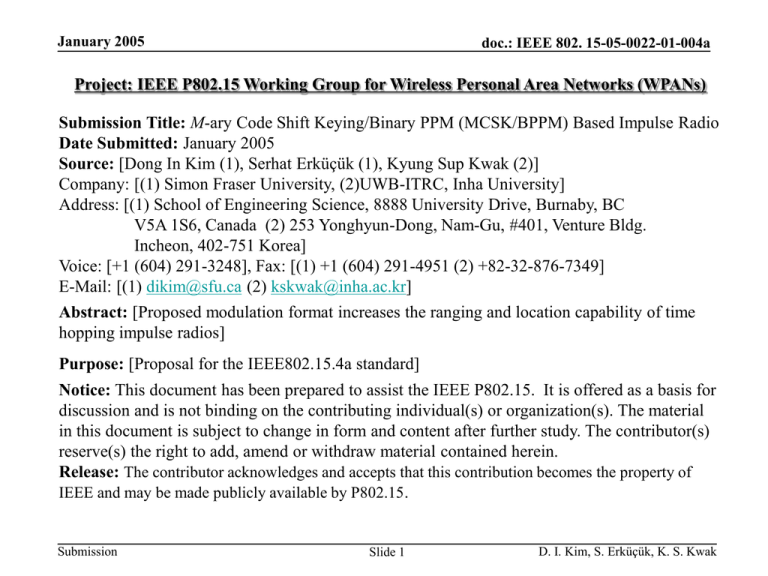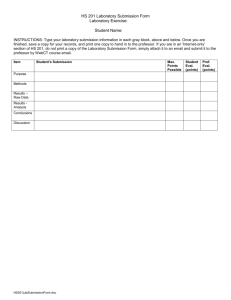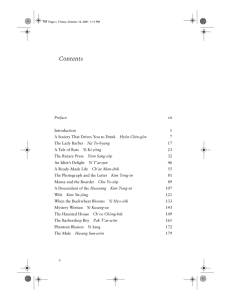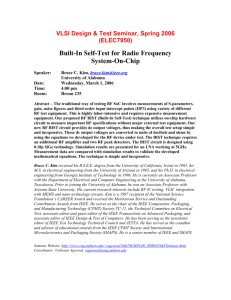15-05-0022-01-004a-mcsk-bppm-based-impulse
advertisement

January 2005 doc.: IEEE 802. 15-05-0022-01-004a Project: IEEE P802.15 Working Group for Wireless Personal Area Networks (WPANs) Submission Title: M-ary Code Shift Keying/Binary PPM (MCSK/BPPM) Based Impulse Radio Date Submitted: January 2005 Source: [Dong In Kim (1), Serhat Erküçük (1), Kyung Sup Kwak (2)] Company: [(1) Simon Fraser University, (2)UWB-ITRC, Inha University] Address: [(1) School of Engineering Science, 8888 University Drive, Burnaby, BC V5A 1S6, Canada (2) 253 Yonghyun-Dong, Nam-Gu, #401, Venture Bldg. Incheon, 402-751 Korea] Voice: [+1 (604) 291-3248], Fax: [(1) +1 (604) 291-4951 (2) +82-32-876-7349] E-Mail: [(1) dikim@sfu.ca (2) kskwak@inha.ac.kr] Abstract: [Proposed modulation format increases the ranging and location capability of time hopping impulse radios] Purpose: [Proposal for the IEEE802.15.4a standard] Notice: This document has been prepared to assist the IEEE P802.15. It is offered as a basis for discussion and is not binding on the contributing individual(s) or organization(s). The material in this document is subject to change in form and content after further study. The contributor(s) reserve(s) the right to add, amend or withdraw material contained herein. Release: The contributor acknowledges and accepts that this contribution becomes the property of IEEE and may be made publicly available by P802.15. Submission Slide 1 D. I. Kim, S. Erküçük, K. S. Kwak January 2005 doc.: IEEE 802. 15-05-0022-01-004a Proposal for IEEE 802.15.4 Alternate PHY M-ary Code Shift Keying/Binary PPM (MCSK/BPPM) Based Impulse Radio SFU, Canada & UWB-ITRC, Inha University Republic of Korea Submission Slide 2 D. I. Kim, S. Erküçük, K. S. Kwak January 2005 doc.: IEEE 802. 15-05-0022-01-004a Contents • • • • • • • • TG4a Requirements MCSK/BPPM PHY TX Structure TH Code Assignment Transceiver Architecture Information Rate Location Accuracy Conclusion Submission Slide 3 D. I. Kim, S. Erküçük, K. S. Kwak January 2005 doc.: IEEE 802. 15-05-0022-01-004a TG4a Requirements 802.15.4a PHY MCSK/BPPM compared to TH-BPPM scalable information rates Better BER performance at the same/higher information rates and lower transmit power high precision ranging/ location Improved ranging/location precision capability low power consumption Lower transmit power at the same/higher information rates and better BER performance low complexity and cost No new circuit is needed / simple transceiver structure *MCSK/BPPM: M-ary Code Shift Keying/Binary Pulse Position Modulation **TH-BPPM: Time Hopping Binary Pulse Position Modulation Submission Slide 4 D. I. Kim, S. Erküçük, K. S. Kwak January 2005 doc.: IEEE 802. 15-05-0022-01-004a MCSK/BPPM MCSK: M-ary Code Shift Keying BPPM: Binary Pulse Position Modulation TX TH PPM – user #1 d (1) 1 1 0 1 0 1 . . . 1 1 0 1 TH-BPPM t Tb 0 1 user specific TH code 2Tb 3Tb only for multiple access MCSK/BPPM – user #1 d (1) 1 1 0 1 0 1 . . . 110 TH-BPPM M=4 choose a code M user specific TH codes Tb … 2Tb t 3Tb 1 TH code c3 for multiple access and data modulation Submission 0 101 Slide 5 Tb : Bit time T f : Frame time D. I. Kim, S. Erküçük, K. S. Kwak January 2005 doc.: IEEE 802. 15-05-0022-01-004a PHY TX Structure (1/2) TX - TH codes are periodic with Np - each pulse should be repeated Ns times - Np/Ns=k is an integer M user specific TH codes Example: M 4, N p 8, N s 4 c 0 7 c 3 TH 1 c 2 5 c 3 2 d 1 0 1 1... MCSK C2 5 8 8 2 3 6 4 1 5 6 5 2 8 7 4 1 8 7 3 1 4 2 6 4 8 6 3 7 5 1 7 3 0 Tb 1 4 2 6 2Tb t 0 Tf 2T f 3T f 4T f d 1 0 1 1... 6T f 7T f 8T f Tb : Bit time T f : Frame time BPPM Submission 5T f Slide 6 D. I. Kim, S. Erküçük, K. S. Kwak January 2005 doc.: IEEE 802. 15-05-0022-01-004a PHY TX Structure (2/2) TX - TH codes are periodic with Np - each pulse should be repeated Ns times - Np/Ns=k is an integer M user specific TH codes Information rate vs. BER performance for fixed Ns and varying Np and M Scenario Time domain illustration N p / Ns 1 M 4 2 bits (MCSK) 1 bit (BPPM) 0 N p / Ns 1 M 8 Info. BER rate performance Tb Np/Ns same M increasing 3 bits (MCSK) 1 bit (BPPM) 0 Tb M same N p / Ns 2 3 bits (MCSK) 1 bit (BPPM) M 8 0 1 bit (BPPM) Np/Ns increasing 2Tb Tb Tb : Bit time T f : Submission Slide 7 Frame time D. I. Kim, S. Erküçük, K. S. Kwak January 2005 doc.: IEEE 802. 15-05-0022-01-004a TH Code Assignment (1/2) Nu N p M Each user has M user specific TH codes TX sample-long sequence Generation of TH codes – “Case 1: random assignment” 1 0 1 1 1 0 0 1 0 1 0 0 1 1 0 1 1 1 0 1 0 0 0 1 0 1 0 1 0 0 ... m-sequence: 46 Np 4 M 4 46 20 2l N h ; l 6, N h 64 For Tf = 100ns, Tc = 1ns: 100 slots for multiple access Tf 0 NO! 20 55 c3 c2 c2 c3 55 17 20 13 12 31 61 14 56 5 7 24 26 53 45 35 2 ... c0 c0 c1 c1 user #2 user #1 N u N p N u N p M 1 Submission ? Slide 8 D. I. Kim, S. Erküçük, K. S. Kwak January 2005 doc.: IEEE 802. 15-05-0022-01-004a TH Code Assignment (2/2) Generation of TH codes – “Case 2: no overlapping” user #1 46 user #2 20 55 17 20 13 12 31 61 14 56 5 7 24 26 53 45 35 2 ... user #2 user #1 Np 4 M 4 46 20 55 17 20 55 17 20 55 17 20 13 17 20 13 12 17 13 12 31 no collisions allowed within user codes Submission TX 61 14 ... user #k 56 5 N u N p N u N p M 1 n n: number of overlaps Slide 9 D. I. Kim, S. Erküçük, K. S. Kwak January 2005 doc.: IEEE 802. 15-05-0022-01-004a General Modulation Format • • • • Fixed signal space Increased information rate log 2 M Rs 1 N p / Ns Extra information Random selection of TH codesImproved spectrum Submission TX Slide 10 R D. I. Kim, S. Erküçük, K. S. Kwak January 2005 doc.: IEEE 802. 15-05-0022-01-004a Receiver Structure - MLSE M RX M template signals 2M Np/Ns hardware structure 1 Submission computation complexity 2 correlator Slide 11 N p / N s M D. I. Kim, S. Erküçük, K. S. Kwak January 2005 doc.: IEEE 802. 15-05-0022-01-004a Information Rate (1/3) log 2 M R Rs 1 N /N p s A TH-BPPM Ns = 2, M=1 Info. rate Rs 0 MCSK/BPPM “Constant Energy/Bit” Constraint Ns = 2, Np=2, M=2 MCSK/BPPM “Constant Power” Constraint Ns = 2, Np=2, M=2 Tf R 2T f A’ 2R 0 Tf 2T f A 2R 0 Tf 2T f A’ MCSK/BPPM (same info. rate) “Constant Power” Constraint Ns = 2, Np=2, M=2 R 0 T f 2T f A 1 log 2 M A N p / Ns can be adjusted to achieve higher information rate at lower transmit T 1 log 2 M T f N /N f power and still maintain better BER performance at the same time p s Submission Slide 12 D. I. Kim, S. Erküçük, K. S. Kwak January 2005 doc.: IEEE 802. 15-05-0022-01-004a Information Rate (2/3) MCSK/BPPM “Constant Power” Constraint for Ns = 1, M=8 A Np Ns 0 1 Scalable info. rates Tf A’=2A 0 4R R Tf 2T f 3T f T f 4T f log 2 M R Rs 1 N /N p s BER performance (wrt TH-BPPM) - increased SNR - reduced collusions - no processing gain - not much improvement A Np Ns 0 2 Tf 2T f 2.5R R A’=1.58A 0 Tf 2T f T f 3T f Tf 2T f 4T f 2T f 5T f A Np Ns 3 0 3T f 2R R A’=1.41A 0 Submission Tf T f 2T f 3T f - increased SNR - reduced collusions - processing gain - improved BER - TX power can be lowered - info rate can be increased A 1 log 2 M A N p / Ns log 2 M T T f 1 N /N f p s 4T f 5T f 6T f Slide 13 D. I. Kim, S. Erküçük, K. S. Kwak January 2005 doc.: IEEE 802. 15-05-0022-01-004a Information Rate (3/3) “Constant Power” Constraint Improved performance at the same information rate for M=8 Submission Slide 14 D. I. Kim, S. Erküçük, K. S. Kwak January 2005 doc.: IEEE 802. 15-05-0022-01-004a Location Accuracy Step 0 Procedure Result Initial conditions for TH-BPPM R0 (information rate); BER0 (performance) TX0 (power) MCSK/BPPM “Constant Power” Constraint Comment R1 R0 ; Step 1 Increase M BER1 BER0 ; TX 1 TX 0 Step 2 R1 R2 R0 ; Increase Np/Ns BER1 BER2 ; TX 2 TX 0 Step 3 Increase T’f R1 R2 R3 R0 ; BER2 BER3 ; BER2 may or may not be less than BER0 BER3 may or may not be less than BER0 TX 0 TX 3 R4 R3 R0 ; Step 4 Increase A’ BER3 BER4 & BER0 BER4 ; TX 0 TX 4 TX 3 Increased frame time with longer observation period, higher information rate, better BER performance and lower transmit power Accurate Ranging/Location Submission Slide 15 D. I. Kim, S. Erküçük, K. S. Kwak January 2005 doc.: IEEE 802. 15-05-0022-01-004a Conclusion • MCSK/BPPM provides: increased information rate Simultaneously! lower transmit power better BER performance improved spectral characteristics • MCSK/BPPM is capable of: IEEE 802.15.4a PHY information rate scalability location/ranging accuracy Submission Slide 16 D. I. Kim, S. Erküçük, K. S. Kwak January 2005 doc.: IEEE 802. 15-05-0022-01-004a Back-up Slides Submission Slide 17 D. I. Kim, S. Erküçük, K. S. Kwak January 2005 doc.: IEEE 802. 15-05-0022-01-004a MCSK/BPPM “Constant Power” Constraint Submission Slide 18 D. I. Kim, S. Erküçük, K. S. Kwak January 2005 doc.: IEEE 802. 15-05-0022-01-004a MCSK/BPPM “Constant Energy/Bit” Constraint Submission Slide 19 D. I. Kim, S. Erküçük, K. S. Kwak January 2005 doc.: IEEE 802. 15-05-0022-01-004a Effects of TH Code Design on the Performance MCSK/BPPM “Constant Power” Constraint Submission Slide 20 D. I. Kim, S. Erküçük, K. S. Kwak January 2005 doc.: IEEE 802. 15-05-0022-01-004a TH Code Spectrum of: a) TH-BPPM, Np=10 b) ideal MCSK/BPPM, Np c) realistic MCSK/BPPM Fig. a. TH-BPPM Fig. b. ideal MCSK/BPPM Submission Fig. c. realistic MCSK/BPPM Slide 21 D. I. Kim, S. Erküçük, K. S. Kwak





